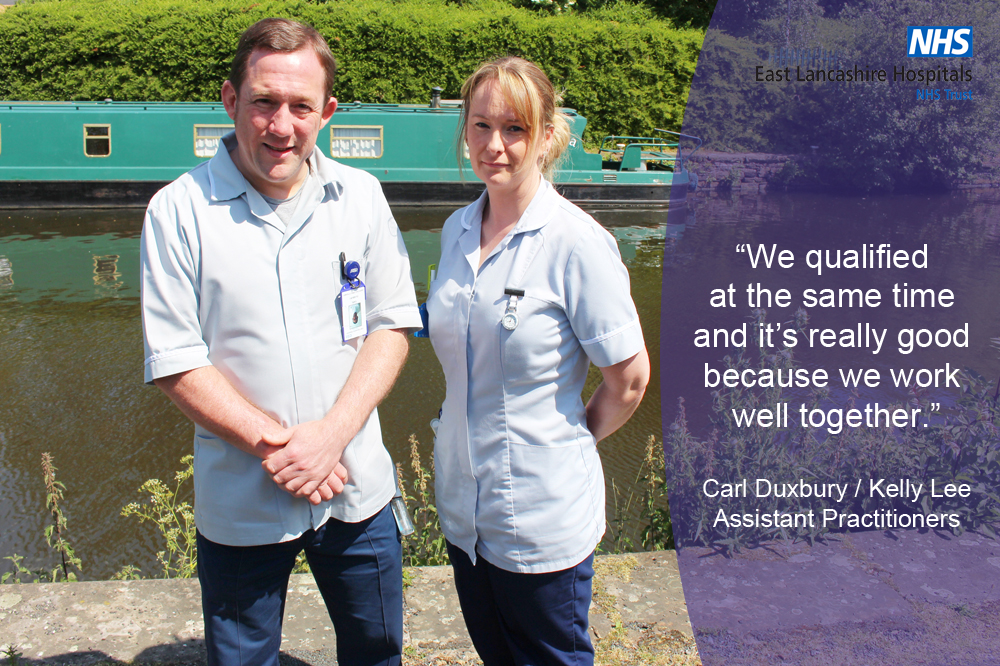
Community Assistant Practitioners: exploiting extra skills to meet future patient needs
Developing the role of the assistant practitioner is helping East Lancashire Hospitals NHS Trust (ELHT) ensure we have the right flexible mix of skills to meet patient needs and freeing up registered nurses to deliver what they have been uniquely trained for.
What is an assistant practitioner?
Here at ELHT, Assistant Practitioners are able to deliver elements of health and social care and undertake clinical work in domains that have previously only been within the remit of registered professionals (Band 5 and above).
An assistant practitioner (Band 4) is a non-occupational specific role developed to assist the delivery of high quality and patient centred services in a variety of settings. Below is an interview with two Assistant Practitioners who are integral members of the multi-disciplinary team serving patients in Pendle.
Names: Kelly Lee and Carl Duxbury
Job Title: Community Assistant Practitioners (AP) Band 4
Base: Yarnspinners Primary Health Care Centre, Nelson
What is an Assistant Practitioner?
Carl: An assistant practitioner is a worker who competently delivers health and social care for people. We have a level of knowledge and skill beyond that of the traditional healthcare assistant or support worker. And we’re here to support Band 5 staff, take a bit of pressure off them and accept more responsibility.
Kelly: I agree. It’s about getting the right clinical skills for the patient, so with more complex patients coming into the community means we see patients that traditionally a Band 5 might see.
We’re an ideal fit between the healthcare assistant and a registered District Nurse, allowing the ‘Named Nurse’ to undertake assessments, care planning, delivery of more complex care, and reviews of their caseload of patients.
Carl and myself have both completed two-year Foundation Degrees with UCLan, so we’re qualified to carry out certain treatments such as blood glucose monitoring, insulin injections and bowel care.
It works really well. We have clarity around duties and responsibilities of the role, and how we fit into the wider multidisciplinary team.
How did you become Assistant Practitioners?
Carl: Before being an AP I was a Healthcare Assistant, starting that role in 2008 and then the AP role came along in 2012.
Kelly: We were both community-based Healthcare Assistants who completed our two-year foundation degrees and qualifying as APs in 2014.
Carl: I was working in Urgent Support, supporting patients when they came out of hospital. We look at the patient holistically, we don’t just go in and perform one task.
Kelly: As Band 4s we’re able to do more clinical tasks such as catheter care, bladder washes, wound care, continence assessments and compression bandaging. Typically, we will get more of the complex phlebotomy work, along with the HCAs.
The Band 5 nurses acknowledge the work we do – we’re not competing with them, it’s more of a supporting role allowing them to carry out duties such as palliative care, for example.
Carl: So when a complex patient comes out of hospital, the Band 5 nurses can concentrate on that patient knowing the APs will be there to support the stabilised patients.
Kelly: It was an excellent bridge for me between HCA and Band 5. I couldn’t afford to come out of work to do my nurse training but I did want to get additional training and career development, so the AP Band 4 role was ideal.
How did you find the demands of two-year Foundation Degree study and a full-time career?
Kelly: It was tough but it was a great opportunity. I received really good support from Band 5, 6 and 7 colleagues while I was training, going out with the Band 5s to improve our skills. And the Trust also supported us with day release for study.
Carl: Now we work without supervision a lot of the time but we know we have support from Band 5/6/7 nurses when we need it. Typically we get allocated home visits in the morning via EMIS, followed by a handover team meeting at Yarnspinners where we can discuss any concerns. And while we have the autonomy of being on our own when visiting patients, we have support available whenever we need it.
We qualified at the same time and it’s been really good because we work well together. We’re lucky really and are always bouncing ideas off each other.
Kelly: It’s a great stepping stone from being an HCA. I may continue and study to become a Band 5 but I’m not sure I would have done that straight from being an HCA.
Carl: Stepping up from a Band 3, it can seem daunting. But being an AP is a really enjoyable role and we’ve got the support we need. We are accountable to ourselves, our colleagues and, most importantly, the patients we serve.
Kelly: We have a big team at Yarnspinners and we’ve both been here for a few years now which is testament to how well things are going. And working in Pendle is interesting with some deprived areas and also affluent ones as well. You get to see people from all walks of life which keeps our job interesting.
Carl: The ways things are going with more patients being cared for in the community and we play an important role in their care, it’s an interesting time to be an Assistant Practitioner.
And with a lot of Band 5 work taken up with initial patient assessments and the paperwork that involves, it gives us APs great opportunities.
Belinda Taylor (INT Manager): We must ensure Assistant Practitioners are used to their full potential.
Kelly, Carl and all our Community Assistant Practitioners are an integral part of the work we do to meet current patient needs and future projected needs.
Community APs are heavily involved in delivery of all patient care, and we can see a day in the future when they will focus more on the most complex clinical care.


